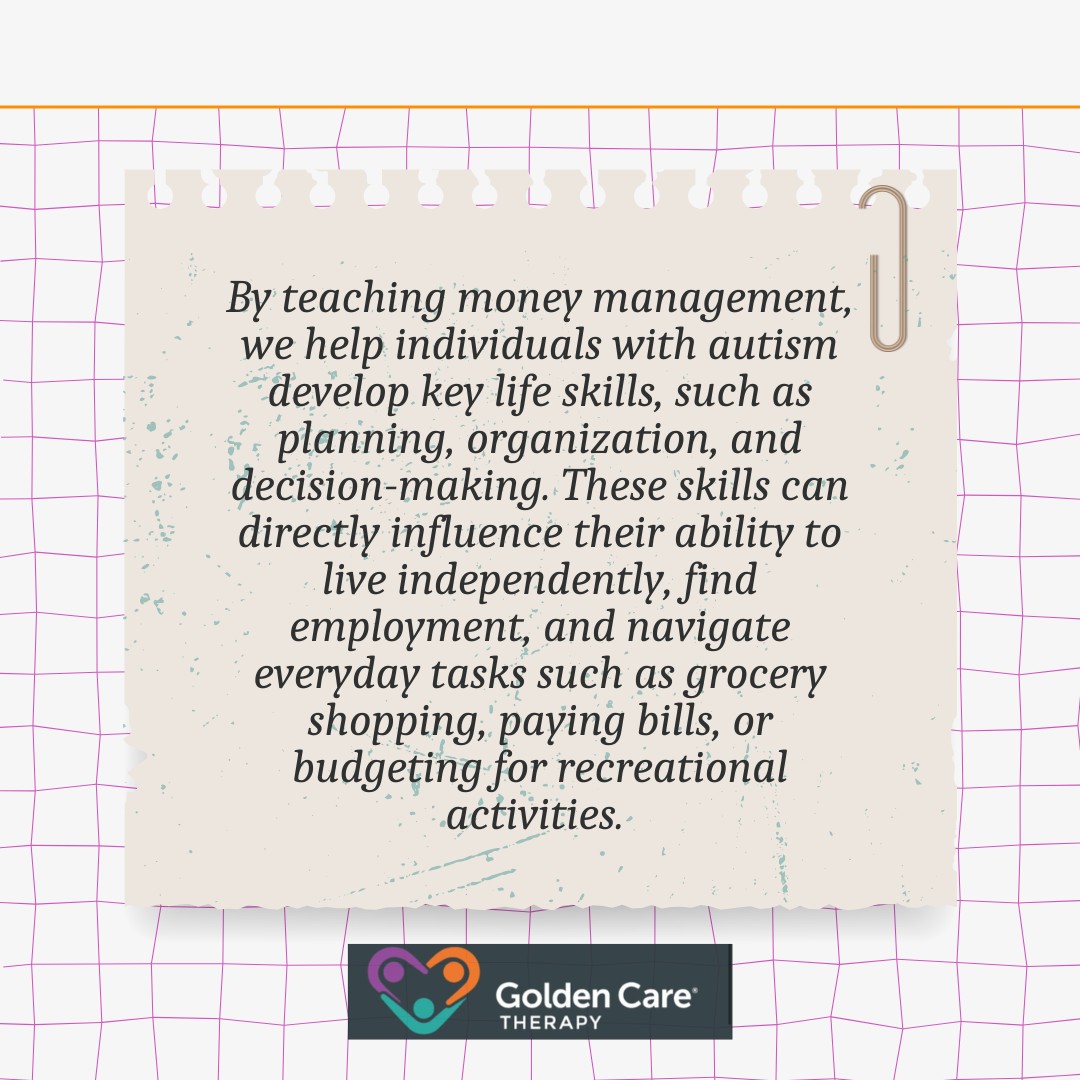Money management is a crucial life skill that many individuals need to navigate daily life successfully. For individuals with autism, teaching independence through tailored strategies can be essential in helping them master these skills, as it accommodates their unique learning styles and needs.
Early intervention and targeted support can help individuals with autism achieve greater financial independence and make informed decisions about their finances. By teaching money management skills, we empower individuals with autism to take control of their financial well-being, leading to increased self-confidence and greater participation in society.
Why Money Management Skills Matter for Individuals with Autism
Money management is more than just budgeting and saving; it’s about understanding the value of money, making informed financial decisions, and learning to prioritize needs versus wants.
For autistic individuals, these skills are not always intuitive. Individuals on the autism spectrum may struggle with abstract thinking, social communication, or executive functioning, making the process of managing money more challenging.

Without these skills, individuals with autism may face difficulties in these areas, leading to increased dependency on caregivers and limited opportunities for autonomy.
4 Key Challenges in Teaching Money Management
Teaching money management to individuals with autism can present unique challenges that require careful planning and adaptation. Each individual with autism has different strengths, weaknesses, and needs, so one approach may not work for everyone.
Some of these challenges include the following:
Difficulty with Abstract Concepts
Money management involves understanding abstract concepts like saving, budgeting, and spending wisely. Many individuals with autism excel at concrete tasks but struggle with abstract thinking, making it difficult to grasp the long-term implications of their financial choices.
For instance, an individual may struggle to understand the concept of saving money for future needs, or they may have difficulty distinguishing between essential and non-essential items.
Sensory Sensitivities and Distractions
Individuals with autism may have heightened sensory sensitivities, which can impact their ability to focus on lessons or tasks related to money management. Bright lights, loud noises, or uncomfortable textures can become overwhelming and cause distractions, making it hard for individuals to concentrate on the task at hand.
Executive Functioning Deficits
Executive functioning skills, such as organization, planning, and impulse control, are essential for managing money. Many individuals with autism experience challenges with executive functioning, which can affect their ability to track expenses, prioritize tasks, and follow through with financial goals.
Social Understanding and Communication Difficulties
Social understanding and communication skills also play a role in money management. Individuals with autism may struggle to communicate effectively with others in situations that involve financial decisions, such as negotiating prices, asking for discounts, or understanding how others approach financial transactions.
These challenges can make it difficult to participate in everyday financial activities like shopping or paying for services.

5 Effective Strategies for Teaching Money Management
Despite the challenges, several strategies can help teach money management skills to individuals with autism. By using structured, individualized approaches, caregivers and educators can foster a positive learning experience and help individuals with autism gain confidence in their financial abilities.
Here are some strategies worth considering:
Start with Concrete Concepts
One of the most effective ways to teach money management is by starting with concrete concepts and gradually progressing to more abstract ideas. For example, begin with teaching the basic names of coins and bills, followed by practicing simple transactions.
Use real coins and bills for hands-on practice, as this tactile experience can help solidify the concept of money.
When teaching how to make purchases, use role-playing scenarios. For example, set up a mock store where the individual can buy and sell items using real or play money. This exercise not only helps the individual practice their math skills but also gives them a sense of real-world experience when it comes to exchanging money.
Use Visual Supports
Many individuals with autism are visual learners, so incorporating visual supports into money management lessons can enhance understanding. Visual aids such as money charts, pictorial representations of expenses, or step-by-step guides can help individuals grasp financial concepts more easily.
For instance, a visual schedule can show the steps involved in a shopping trip, from creating a shopping list to purchasing items and checking out.
In addition to visual schedules, consider using visual budgeting tools. These can include charts or apps that help individuals track their income and expenses. Color-coded charts or financial trackers that break down spending categories can make it easier for individuals to understand where their money is going and how to manage it more effectively.
Break Down Complex Tasks
Money management involves a variety of tasks, such as saving, budgeting, and shopping. Breaking these tasks down into smaller, manageable steps can help individuals with autism learn each component of money management in isolation before putting them all together.
For example, when teaching budgeting, break it down into specific tasks like identifying income sources, categorizing expenses, and setting savings goals. By mastering each individual component, individuals can gradually work up to handling more complex financial tasks.
Create Structured Practice Opportunities
To reinforce money management skills, it’s important to provide plenty of opportunities for practice in a structured environment. Structured practice sessions allow individuals to apply what they’ve learned in real-world situations, making it easier to generalize skills.
For example, organize outings to the store where the individual can practice purchasing items, making changes, and sticking to a budget. Provide guidance and support as needed but encourage independence by stepping back once the individual feels more confident.
Consider setting up a budget for everyday activities and encourage the individual to track their spending during the week. Regularly review their spending habits together to discuss areas where they may need improvement, such as cutting back on impulse purchases or setting aside money for savings.
Use Technology to Enhance Learning
Technology can be a powerful tool for teaching money management skills. There are numerous apps and online resources designed specifically to help individuals with autism manage their finances.
For example, budgeting apps that track expenses and savings goals can help individuals with autism stay organized and monitor their spending habits.
In addition, educational apps focused on financial literacy can offer interactive lessons on topics such as counting money, understanding the value of different coins and bills, and practicing basic math skills. These apps can be customized to fit the learning needs and preferences of the individual.
Final Thoughts
Teaching money management skills to individuals with autism is an essential part of fostering independence and inclusion. While the process can present challenges, implementing effective strategies, such as starting with concrete concepts, using visual supports, breaking tasks into manageable steps, and providing structured practice opportunities, can make a significant difference.
With time and consistent effort, individuals with autism can develop the skills they need to manage their finances, make informed decisions, and enjoy greater financial independence. We at Golden Care Therapy offer ABA therapy services to support individuals on their journey to success. Our dedicated team works closely with each individual, helping them develop vital skills in a nurturing and understanding environment.
If you’re looking for exceptional autism services in Georgia, New Jersey, Indiana, New York, or Florida, don’t hesitate to reach out to us. Contact us today to learn how we can support you or your loved one with personalized care.

